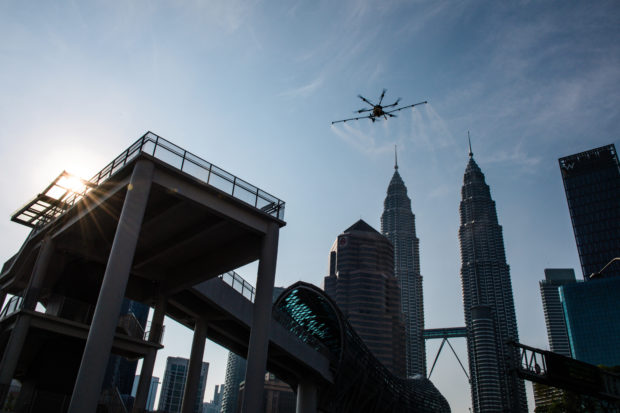
A drone sprays disinfectant during a demonstration during the Movement Control Order, limiting the activities of people in Malaysia as a preventive measure against the spread of the COVID-19 novel coronavirus, in Kuala Lumpur on March 31, 2020, as the Petronas Twin Towers is seen in the background. AFP FILE PHOTO
PUTRAJAYA — With no spike in coronavirus cases after Hari Raya Aidilfitri, it is time for Malaysia to reopen more sectors, according to the country’s health director-general.
Datuk Dr Noor Hisham Abdullah said the health ministry had been expecting a rise in Covid-19 cases after the holiday period but that the data showed otherwise.
“Besides the economic sector, we will open up others including sports, social and education,” Dr Noor Hisham said during his daily briefing on Sunday (May 7).
“Currently, the conditional movement control order (MCO) is working as we have been able to control the rate of infection to double digits.
“As for infections among Malaysians, it is registering only a single digit.”
But Dr Noor Hisham said the compliance rate of conditional MCO among foreigners should be increased.
“Action has been taken and we have a committee looking into how we can improve the rate,” he said.
On an earlier announcement that barber shops, hair salons and beauty parlors would be allowed to resume operations on June 10, he said the ministry would monitor the situation closely.
On the latest statistics, Dr Noor Hisham said there were 37 new cases and 25 new recoveries from the disease over the past 24 hours.
Of the total, eight were imported cases. From the 29 local cases, 19 involved foreigners.
He said there was one new death – a 79-year-old local woman, bringing the death toll to 117.
On the clusters at Immigration depots, Dr Noor Hisham said only the results of two detainees at the Bukit Jalil depot were still pending.
“We don’t expect another spike in such cases. Those who tested negative should be deported,” he said.
Dr Noor Hisham added that infectious disease protocols needed to be improved at depots and other holding areas under the police and Prisons Department.